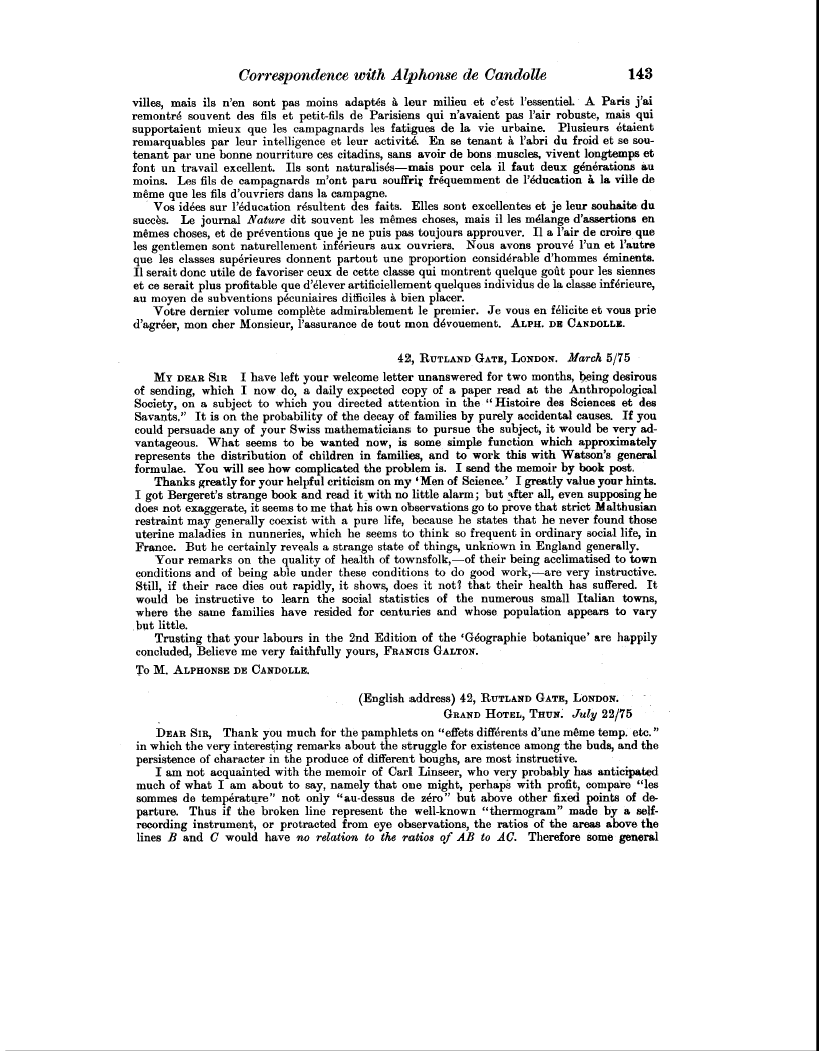Correspondence with Alphonse de Candolle 143
villes, mais ils n'en sont pas moins adaptes a leur milieu et c'est 1'essentiel. A Paris jai remontre souvent des fils et petit-fils de Parisiens qui n'avaient pas l'air robuste, mais qui supportaient mieux que les campagnards les fatigues de la vie urbaine. Plusieurs etaient remarquables par leur intelligence et leur activite. En se tenant a l'abri du froid et se sontenant par une bonne nourriture ces citadins, sans avoir de bons muscles, vivent longtemps et font un travail excellent. Its sont naturalises-mais pour cela i1 faut deux generations au moins. Les fils de campagnards m'ont paru souffri; frequemment de l'education a la ville de meme que les fils d'ouvriers dans la campagne.
Vos idees sur l'education resultent des faits. Elles sont excellentes et je leur souhaite du suttees. Le journal Nature dit souvent les memes choses, mais it les melange d'assertions en memes choses, et de preventions que je ne puffs pas toujours approuver. II a I'air de croire que les gentlemen sont naturellement inferieurs aux ouvriers. Nous avons prouve l'un et 1'autre que les classes superieures donnent partout une proportion considerable d'hommes eminents. Il serait done utile de favoriser ceux de cette classe qui montrent quelque gout pour les siennes et ce serait plus profitable que d'elever artificiellement quelques individus de la classe inferieure, au moyen de subventions pecuniaires difficiles a bien placer.
Votre dernier volume complete admirablement le premier. Je vous en felicite et vous prie d'agreer, mon cber Monsieur, l'assurance de tout mon devouement. ALPH. DE CANDOLLE.
42, RUTLAND GATE, LONDON. March 5/75
MY DEAR SIR I have left your welcome letter unanswered for two months, being desirous of sending, which I now do, a daily expected copy of a paper read at the Anthropological Society, on a subject to which you directed attention in the " Histoire des Sciences et des Savants." It is on the probability of the decay of families by purely accidental causes. If you could persuade any of your Swiss mathematicians to pursue the subject, it would be very advantageous. What seems to be wanted now, is some simple function which approximately represents the distribution of children in families, and to work this with Watson's general formulae. You will see how complicated the problem is. I send the memoir by book post.
Thanks greatly for your helpful criticism on my 'Men of Science.' I greatly value your hints. I got Bergeret's strange book and read it with no little alarm; but after all, even supposing he does not exaggerate, it seems to me that his own observations go to prove that strict Malthusian restraint may generally coexist with a pure life, because he states that he never found those uterine maladies in nunneries, which he seems to think so frequent in ordinary social life, in France. But he certainly reveals a strange state of things, unknown in England generally.
Your remarks on the quality of health of townsfolk,-of their being acclimatised to town conditions and of being able under these conditions to do good work,-are very instructive. Still, if their race dies out rapidly, it shows, does it not? that their health has suffered. It would be instructive to learn the social statistics of the numerous small Italian towns, where the same families have resided for centuries and whose population appears to vary .but little.
Trusting that your labours in the 2nd Edition of the 'Geographie botanique' are happily concluded, Believe me very faithfully yours, FRANCIS GALTON.
To M. ALPHONSE DE CANDOLLE.
(English address) 42, RUTLAND GATE, LONDON. GRAND HOTEL, THUN: July 22/75
DEAR SIR, Thank you much for the pamphlets on "effets differents d'une meme temp. etc." in which the very interesting remarks about the struggle for existence among the buds, and the persistence of character in the produce of different boughs, are most instructive.
I am not acquainted with the memoir of Carl Linseer, who very probably has anticipated much of what I am about to say, namely that one might, perhaps with profit, compare "les sommes de temperature" not only "au-dessus de zero" but above other fixed points of departure. Thus if the broken line represent the well-known "thermogram" made by a selfrecording instrument, or protracted from eye observations, the ratios of the areas above the lines B and C would have no relation to the ratios of AB to AC. Therefore some general

